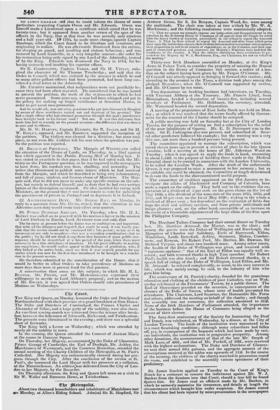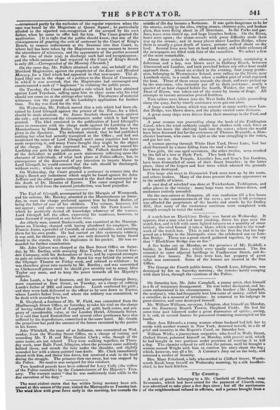Sir James Scarlett applied on Tuesday to the Court of
King's Bench for a certiorari to remove the indictment against Mr. W. J. Bankes from the Sessions into that Court, should a true bill be found against him. Sir James read an affidavit made by Mr. Bankes, in which be earnestly maintains his innocence, and details at length the circumstances which brought him under suspicion. Sir James stated that his client had been injured by misrepresentation in the newspapers
.--occasioned partly by the exclusion of the regular reporters when the case was heard by the Magistrate at Queen Square ; he particularly
• alluded to the reported non-recognition of the accused by his own father, when he came to offer bail for him. The Court granted the
application. [ It is right that the public should know, that one of the consequences of granting the writ of certiorari by the Court of King's Bench, to remove indictments at the Sessions into that Court, is, where bail has been taken by the Magistrates to any amount to insure the attendance of witnesses, and the appearance of the parties accused at the time of their trial, to discharge such bail and recognizances :end the whole amount of bail required by the Court of King's Bench is ,enly 0l.—Correspondent of the Morning Chronicle.] On the same day, Mr. Follett obtained a rule nisi, on behalf of the 'Hertford Magistrates, against the proprietor of the issex and Hertford Mercury, for a libel which bad appeared in that newspaper. The al- leged libgl was in the shape of a petition to the House of Commons, in which it was asserted, that the Magistrates had encouraged and countenanced'a mob of " buglemen " in violating the public peace.
On Tuesday, the Court discharged a rule which had been obtained :against Lord Teynham, calling upon him to show cause why his trial should not come on at the sittings after term. The absence of material witnesses was the ground of his Lordship's application for further time. No day was fixed for the trial.
On Wednesday, Mr. Pollock moved that a rule which had been ob- tained by Lord Glengall against the printer of the Times, for a libel, should be made absolute. Sir James Scarlett showed cause against the rule ; and mentioned the circumstances under which it had been granted. The libel consisted in the publication of Lord Glengall's name in connexion with the charge made against his Lordship at the Mansionhouse by Dorah Butler, the particulars of which have been given in the Spectator. The defendant stated, that he had published nothing but what had actually transpired at the Office ; and had not mentioned the name of Lord Glengall until many inquiries had been made respecting it, and many Peers thought they might be the object of the charge. He also expressed his regret at having caused his Lordship any pain by the publication. Mr. Pollock denied the right of the defendant to publish ex parte statements reflecting upon the character of individuals, of what took place at Police-offices; but, in consequence of the disavowal of any intention to impute blame to Lord Glengall, he would consent that the rule should be discharged, without costs; which was accordingly done.
On Wednesday, the Court granted a certiorari to remove into the King's Bench any indictment which might be found against Sir John Jeffcott and the other parties concerned in the duel that terminated in the death of Dr. Henniss of Exeter. The cause assigned for re- moving the trial from the natural jurisdiction, was local prejudice.























 Previous page
Previous page